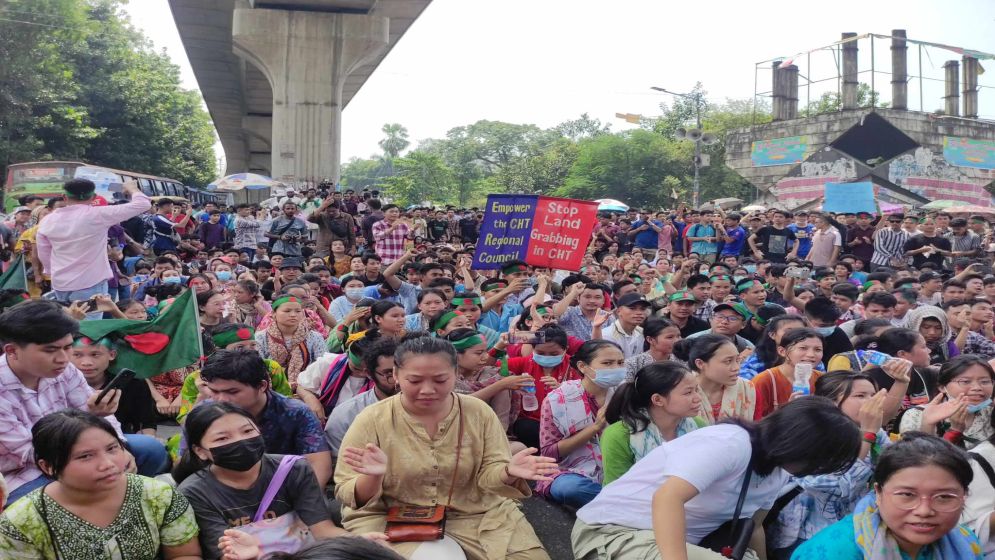Protest in Dhaka over attacks on Jumma people in Khagrachari; call for 72-hour blockade
UNB
Publish: 21 Sep 2024, 01:46 PM

DHAKA,
Sept. 20 (UNB) Indigenous Jumma people residing in Dhaka staged a protest march
and rally Friday at the University of Dhaka's TSC, calling for a 72-hour
blockade of roads and waterways in their home districts of the Chittagong Hill
Tracts.
The protest was in
response to recent arson attacks and indiscriminate military firing in
Khagrachari, with demonstrators demanding justice for the victims.
The protest began at
10am at the Anti-Terrorism Raju Memorial Sculpture, where indigenous students
and citizens denounced the arson incident in Dighinala on Sept. 19, along with
the alleged military violence in the region. Protesters called for punishment
of those responsible and raised concerns over escalating communal tensions.
On Sept. 18, a local
youth in Khagrachhari died after crashing into an electric pole while
attempting to flee from an alleged mob beating. The incident sparked unrest as
settler Bengalis reportedly chased Jumma people in the Pankhaiyapara area. The
next day, a group of settler Bengalis marched in Dighinala, chanting slogans
against the Jumma community, leading to clashes and the burning of Jumma-owned
businesses and homes. At least 30 houses and businesses were torched, according
to local sources, states a press release by the organisers.
Later that night,
military forces allegedly opened fire indiscriminately in multiple areas of Khagrachhari,
killing two Jummas: Junan Chakma from Jamtali and Rubel Chakma from Paltanjay
Para. The violence left at least 40 people injured, with many still receiving
treatment in hospitals, it added.
During the protest,
demonstrators decried further attacks by settler Bengalis on indigenous people
in various parts of Rangamati. They reported the vandalism and looting of homes
and religious sites, including the Bonrupa Maitri Monastery, where one
indigenous person, Anik Kumar Chakma, was killed.
Speakers at the rally
included Nabangsu Chakma, a law student at Dhaka University, who presided over
the event, and Satez Chakma, a history student at the university, who served as
moderator. Other speakers included leaders from indigenous student
organizations, labor associations, and human rights groups.
Nabangsu Chakma
announced a 72-hour blockade of roads and waterways in the Chittagong Hill
Tracts to demand justice for the victims of the violence.
Protesters issued the
following demands:
1. Ensure the safety of
life and property for Jumma residents in the three hill districts, including
those affected by the communal violence in Dighinala.
2. Launch a United
Nations-supervised investigation into the Khagrachari and Dighinala incidents
and punish the perpetrators.
3. Provide compensation
to the families of those killed by military firing and ensure medical treatment
for the injured.
4. Rebuild the damaged
Buddhist monasteries and provide adequate compensation to the owners of
destroyed shops and homes.
5. Dismiss and take
punitive action against military and civilian officials involved in the
violence.
6. Withdraw military and
settler Bengalis from the Chittagong Hill Tracts to establish peace and
stability.
7. Implement the
Chittagong Hill Tracts Agreement and grant autonomy as a political solution to
the ongoing conflict.
The protesters hoped
that the indigenous Jumma people would be included in the broader movement for
a democratic Bangladesh. However, demonstrators said they have instead been met
with violence and oppression, forcing many to flee their homes for safety in
the jungles.
END/UNB/RT/ssk
